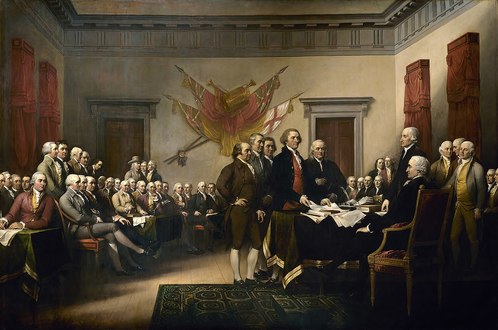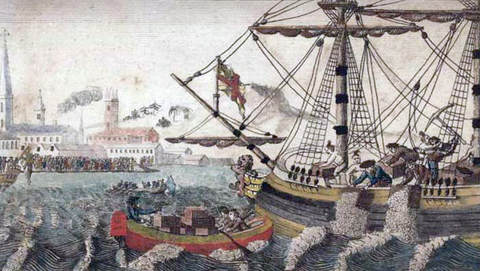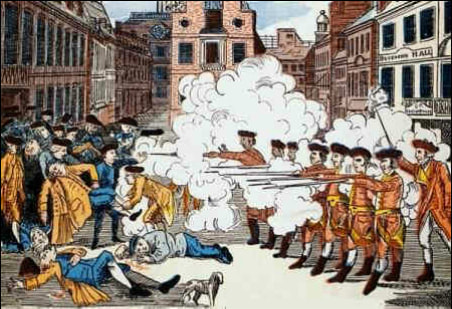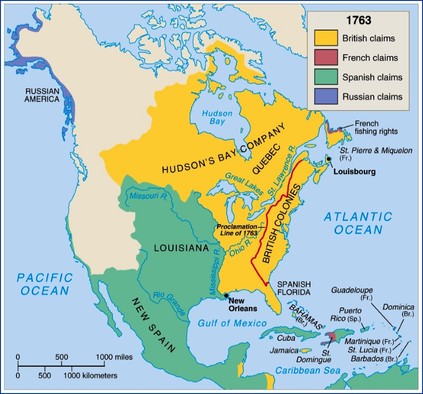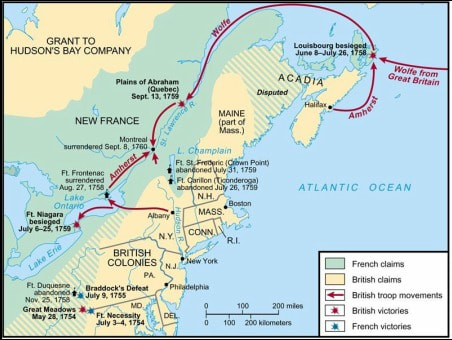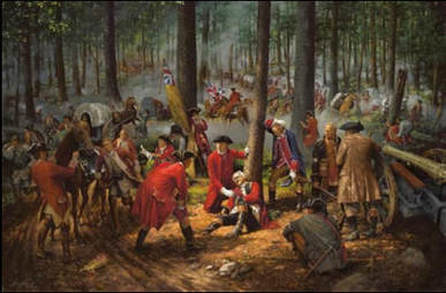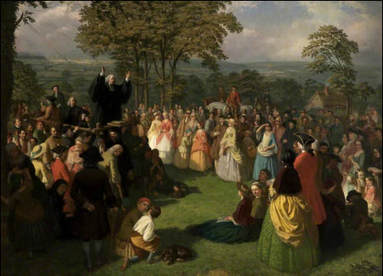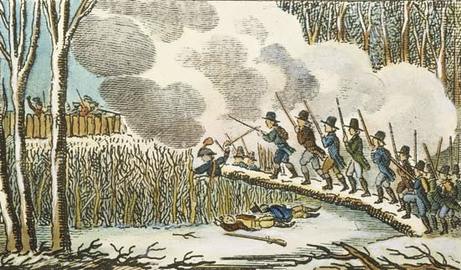|
Content Standards:
Students will analyze how history is a series of connected events shaped by multiple cause and effect relationships, tying past to present. Learning Target: I can summarize the social, political, and economic factors that drove the American colonies to independence. Critical Vocabulary: King George III, Albany Plan of Union, Treaty of Paris, Proclamation of 1763, Writs of Assistance, Sugar Act, Stamp Act, Quartering Act, Stamp Act Congress, Sons of Liberty, Declaratory Act, Townshend Acts, Circular Letter, Boston Massacre, Captain Thomas Preston, Crispus Attucks, Gaspee, British East India Tea Company, Tea Act, Boston Tea Party, Coercive Acts, Quebec Act, Intolerable Acts, First Continental Congress, Second Continental Congress, Lexington and Concord, Continental Army, George Washington, Olive Branch Petition, Hessian, Thomas Paine, Common Sense, Thomas Jefferson Today's Agenda:
Homework: The American Revolution Reading
0 Comments
Content Standards:
Students will analyze how history is a series of connected events shaped by multiple cause and effect relationships, tying past to present. Learning Target: I can summarize the social, political, and economic factors that drove the American colonies to independence. Critical Vocabulary: King George III, Albany Plan of Union, Treaty of Paris, Proclamation of 1763, Writs of Assistance, Sugar Act, Stamp Act, Quartering Act, Stamp Act Congress, Sons of Liberty, Declaratory Act, Townshend Acts, Circular Letter, Boston Massacre, Captain Thomas Preston, Crispus Attucks, Gaspee, British East India Tea Company, Tea Act, Boston Tea Party, Coercive Acts, Quebec Act, Intolerable Acts, First Continental Congress, Second Continental Congress, Lexington and Concord, Continental Army, George Washington, Olive Branch Petition, Hessian, Thomas Paine, Common Sense, Thomas Jefferson Today's Agenda:
Homework: Revolutionary America Reading
Content Standards:
Students will analyze how history is a series of connected events shaped by multiple cause and effect relationships, tying past to present. Learning Target: I can summarize the social, political, and economic factors that drove the American colonies to independence. Critical Vocabulary: King George III, Albany Plan of Union, Treaty of Paris, Proclamation of 1763, Writs of Assistance, Sugar Act, Stamp Act, Quartering Act, Stamp Act Congress, Sons of Liberty, Declaratory Act, Townshend Acts, Circular Letter, Boston Massacre, Captain Thomas Preston, Crispus Attucks, Gaspee, British East India Tea Company, Tea Act, Boston Tea Party, Coercive Acts, Quebec Act, Intolerable Acts, First Continental Congress, Second Continental Congress, Lexington and Concord, Continental Army, George Washington, Olive Branch Petition, Hessian, Thomas Paine, Common Sense, Thomas Jefferson Today's Agenda:
Homework: Revolutionary America Reading Content Standards:
Students will analyze how history is a series of connected events shaped by multiple cause and effect relationships, tying past to present. Learning Target: I can summarize the social, political, and economic factors that drove the American colonies to independence. Critical Vocabulary: King George III, Albany Plan of Union, Treaty of Paris, Proclamation of 1763, Writs of Assistance, Sugar Act, Stamp Act, Quartering Act, Stamp Act Congress, Sons of Liberty, Declaratory Act, Townshend Acts, Circular Letter, Boston Massacre, Captain Thomas Preston, Crispus Attucks, Gaspee, British East India Tea Company, Tea Act, Boston Tea Party, Coercive Acts, Quebec Act, Intolerable Acts, First Continental Congress, Second Continental Congress, Lexington and Concord, Continental Army, George Washington, Olive Branch Petition, Hessian, Thomas Paine, Common Sense, Thomas Jefferson Today's Agenda:
Homework: Revolutionary America Reading Content Standards:
Students will analyze how history is a series of connected events shaped by multiple cause and effect relationships, tying past to present. Learning Target: I can summarize the social, political, and economic factors that drove the American colonies to independence. Critical Vocabulary: King George III, Albany Plan of Union, Treaty of Paris, Proclamation of 1763, Writs of Assistance, Sugar Act, Stamp Act, Quartering Act, Stamp Act Congress, Sons of Liberty, Declaratory Act, Townshend Acts, Circular Letter, Boston Massacre, Captain Thomas Preston, Crispus Attucks, Gaspee, British East India Tea Company, Tea Act, Boston Tea Party, Coercive Acts, Quebec Act, Intolerable Acts, First Continental Congress, Second Continental Congress, Lexington and Concord, Continental Army, George Washington, Olive Branch Petition, Hessian, Thomas Paine, Common Sense, Thomas Jefferson Today's Agenda:
Homework: Revolutionary America Reading Content Standards:
Students will analyze how history is a series of connected events shaped by multiple cause and effect relationships, tying past to present. Learning Target: I can summarize the social, political, and economic factors that drove the American colonies to independence. Critical Vocabulary: King George III, Albany Plan of Union, Treaty of Paris, Proclamation of 1763, Writs of Assistance, Sugar Act, Stamp Act, Quartering Act, Stamp Act Congress, Sons of Liberty, Declaratory Act, Townshend Acts, Circular Letter, Boston Massacre, Captain Thomas Preston, Crispus Attucks, Gaspee, British East India Tea Company, Tea Act, Boston Tea Party, Coercive Acts, Quebec Act, Intolerable Acts, First Continental Congress, Second Continental Congress, Lexington and Concord, Continental Army, George Washington, Olive Branch Petition, Hessian, Thomas Paine, Common Sense, Thomas Jefferson Today's Agenda:
Homework: Revolutionary America Reading Content Standards:
Students will analyze how history is a series of connected events shaped by multiple cause and effect relationships, tying past to present. Learning Target: I can summarize the major events of the French and Indian War, & I can analyze its impact on the colonies. Critical Vocabulary: Huron Indians, Iroquois Indians, Samuel de Champlain, New France, Louisbourg, George Washington, Fort Duquesne, French and Indian War, Benjamin Franklin, Albany Plan of Union, Seven Years’ War, General Edward Braddock, William Pitt, Paris Peace Settlement of 1763, Acadians, Pontiac's Rebellion, Proclamation on 1763 Today's Agenda:
Homework: Revolutionary America Reading Content Standards:
Students will analyze how history is a series of connected events shaped by multiple cause and effect relationships, tying past to present. Learning Target: I can summarize the major events of the French and Indian War, & I can analyze its impact on the colonies. Critical Vocabulary: Huron Indians, Iroquois Indians, Samuel de Champlain, New France, Louisbourg, George Washington, Fort Duquesne, French and Indian War, Benjamin Franklin, Albany Plan of Union, Seven Years’ War, General Edward Braddock, William Pitt, Paris Peace Settlement of 1763, Acadians, Pontiac’s Rebellion, Proclamation of 1763 Today's Agenda:
Homework: Revolutionary America Reading Content Standards:
Students will analyze how history is a series of connected events shaped by multiple cause and effect relationships, tying past to present. Learning Target: I can discuss the ideas of the Enlightenment and the Great Awakening, & I can evaluate the extent to which each influenced the development of the American identity. Critical Vocabulary: Enlightenment, Benjamin Franklin, Great Awakening, Jonathan Edwards, George Whitefield, “Old Lights,” “New Lights” Today's Agenda:
Homework: Revolutionary America Reading Content Standards:
Students will analyze how history is a series of connected events shaped by multiple cause and effect relationships, tying past to present. Learning Target: I can trace the history of the New England colonies, and I can describe the religious institutions that emerged as a result. Critical Vocabulary: Pilgrims, Plymouth Bay, Mayflower Compact, William Bradford, Squanto, Massachusetts Bay Company, John Winthrop, "A Model of Christian Charity," Harvard College, Roger Williams, Anne Hutchinson, Thomas Hooker, Fundamental Orders of Connecticut, Pequot War, King Philip, King Philip’s War Today's Agenda:
Homework: The English Colonies Reading |
A life is not important except in the impact it has on other lives.
-Jackie Robinson AnnouncementsApril 20: Prom
April 28: AP Saturday May 3: No School May 9: On Demand Test May 10: AP Exam May 13: Science Test May 21: No School May 27: No School May 30: Last Day Due DatesArchives
May 2019
Visitors |
